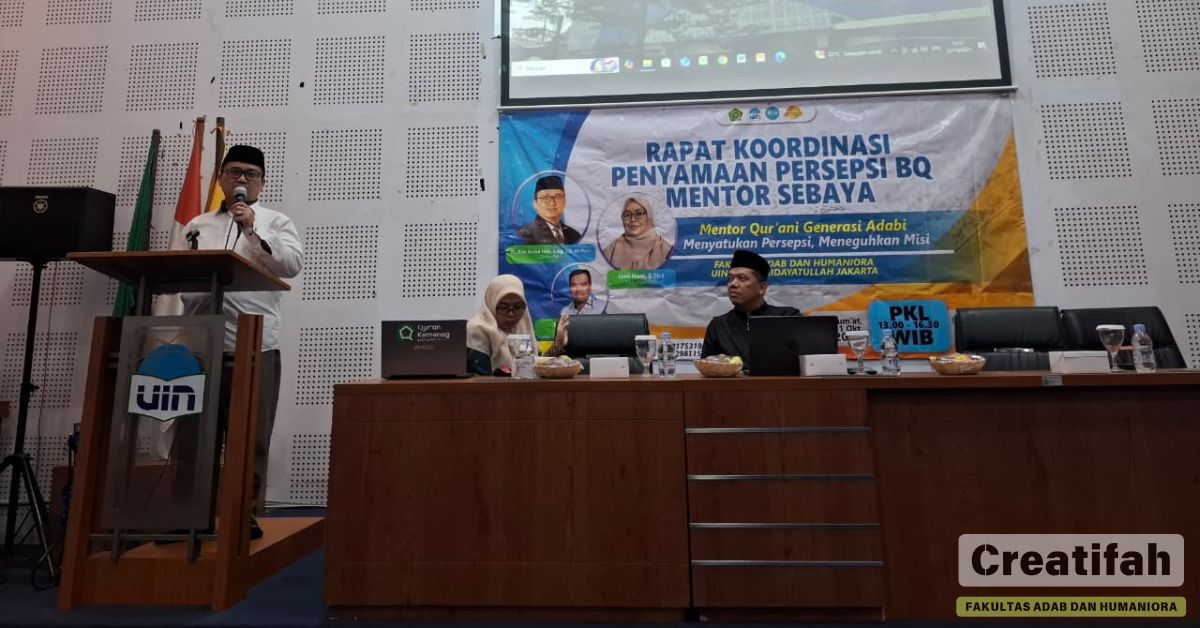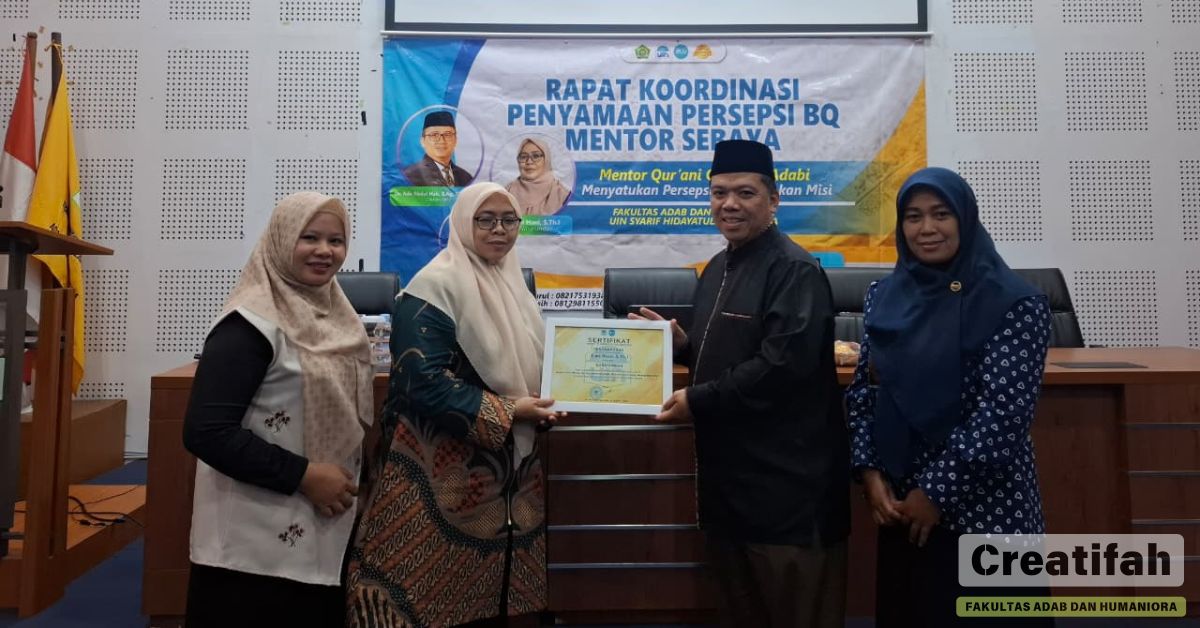Workshop on Equalizing Perceptions of Reading the Qur'an (BQ) Peer Mentors: “Qur'anic Mentors, Adab Generation: Uniting Perceptions, Strengthening the Development Mission”
FAH News Online, South Tangerang – Faculty of Adab and Humanities (FAH) Syarif Hidayatullah State Islamic University Jakarta held a Workshop on Equalizing the Perceptions of BQ Peer Mentors with the theme “Qur'anic Mentors, Adab Generation: Uniting Perceptions, Strengthening Missions”, on Friday (31/10) at 13.00–16.30 WIB at the Bustami Abdul Ghani Theater, 5th floor of FAH. This activity presented Mrs. Umi Hani, S.Th.I as the presenter and Mr. Hendra, ST, M.Pd. as moderator, and was attended by students in the very smooth category and recommended to be Mentors Peer Reading the Qur'an (BQ) within the Faculty of Adab and Humanities.
In his speech, the Dean of FAH Dr. Ade Abdul Hak, S.Ag., SS, M.Hum., CIQnR., explained that the Peer Mentor program is a direct mandate from the Chancellor of UIN Syarif Hidayatullah Jakarta to ensure that all UIN students have the ability to read the Koran well and correctly.
“BTQ test results show that around two-thirds of students do not read the Koran fluently. "Because of this, we appoint one-third of students who are already fluent as peer mentors to accompany their friends," explained the Dean of the Faculty of Adab and Humanities.
He added that this activity is also a forum for devotion and learning the value of sincerity.
“Peer mentors not only teach, but also do good deeds and instill sincerity. Don't look at how many co-builders there are, because the more you are guided, the greater the reward you get,” the message.
The Chair of PPBQ FAH, Mrs. Dr. Nurul Aini, M.Pd. who emphasizes the important role of peer mentors not only as technical teachers, but also as role models in morals, discipline and da'wah through the Koran.
“A mentor not only guides technically, but also serves as an example in the manners and morals of the Qur'an,” he said. Thank you also went to the Dean and all faculty members for their full support for this program, as well as to Mother Umi Hani who has shared her knowledge and experience as a resource person.
Mr. Hendra, ST, M.Pd. as moderator also explained that this activity was also a perception equalization workshop for peer mentors to have the same understanding regarding coaching methods and goals.
“Mentors must be grateful because they are trusted to develop friends so they can read the Koran well according to the recitation,” he said. He added that the public has high expectations for UIN students, especially in terms of their ability to read the Koran and appear as role models in society.
In a material session hosted by Mrs. Umi Hani, S.Th.I emphasized the importance of the spirit of “Mahir BTQ” as an effort to form a generation of Muslims who love and are fluent in reading the Koran. Through this activity, participants are invited to understand the virtues of reading the Koran with tartil, get to know the stages of learning BTQ starting from mastering hijaiyah letters to tajwid, and develop the determination to be istiqamah in studying and teaching the Koran as the words of the Prophet Muhammad SAW. He also said that mastery of tajwid and makhraj letters is the basis for learning to read the Koran.
“Don't rush to learn tones before the tajwid and makhraj letters are correct. Tajwid is the spirit of beautiful reading,” he stressed. He also reminded that learning the Koran is a long process that requires patience, perseverance and a spirit of da'wah.
In the main session of the Al-Qur'an Reading and Writing Workshop (BTQ), Mrs. Umi Hani, S.Th.I, interactively involved participants to read the Al-Qur'an using the Yanbu'a method volume 1. He explained in detail how to read using this method from the first volume to the last volume, including the level category of each volume which is adapted to the learner's abilities, from basic to advanced level. To increase the enthusiasm of the participants, especially peer mentors, he also invited all participants to sing syi'ir Kalamun, a motivational song that is a characteristic of Yanbu'a learning. Apart from that, Mrs. Umi Hani provided a simulation of questions about the science of tajwid to ensure that participants' understanding and perception was in line with the expected ability standards in BTQ learning.
“Mad reading is often a challenge for readers of the Koran, because the difference does not only lie in the letter mad, but also in the cause, length of the reading, and position of the letters in the verse. Mistakes in recognizing types of mad can affect the beauty and meaning of reading the Koran. Therefore, I want to know all my younger siblings' understanding of the types of mad, starting from mad thabi'i, mad far'i, mad jaiz, to common mad. Please answer by stating the type of mad, its cause, and the length of the reading. I did this to align the knowledge of all peer mentors at the Faculty of Adab and Humanities.”
The activity closed with confirmation of the commitment of all participants to carry out their mandate as peer mentors with full responsibility and sincerity. Participants will also receive a competency certificate and mentor certificate as official recognition from the faculty. With this activity, the Faculty of Adab and Humanities hopes that a Qur'anic generation will be born who will not only be able to read the Qur'an well, but also use Qur'anic values as a guide in academic and social life.
Documentation:



